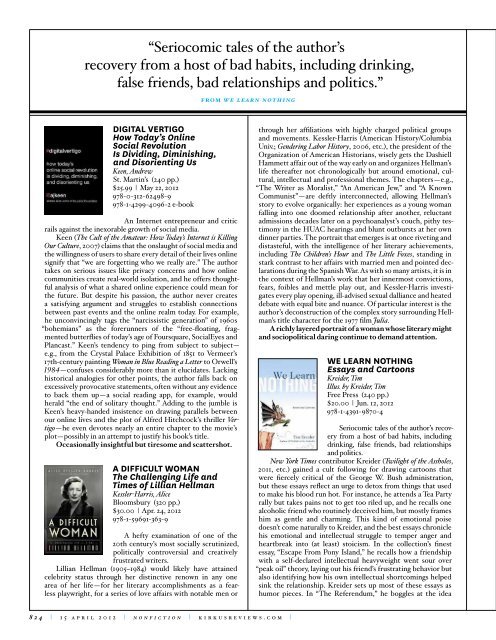nonfiction
nonfiction
nonfiction
Create successful ePaper yourself
Turn your PDF publications into a flip-book with our unique Google optimized e-Paper software.
“Seriocomic tales of the author’s<br />
recovery from a host of bad habits, including drinking,<br />
false friends, bad relationships and politics.”<br />
from we learn nothing<br />
DIGITAL VERTIGO<br />
How Today’s Online<br />
Social Revolution<br />
Is Dividing, Diminishing,<br />
and Disorienting Us<br />
Keen, Andrew<br />
St. Martin’s (240 pp.)<br />
$25.99 | May 22, 2012<br />
978-0-312-62498-9<br />
978-1-4299-4096-2 e-book<br />
An Internet entrepreneur and critic<br />
rails against the inexorable growth of social media.<br />
Keen (The Cult of the Amateur: How Today’s Internet is Killing<br />
Our Culture, 2007) claims that the onslaught of social media and<br />
the willingness of users to share every detail of their lives online<br />
signify that “we are forgetting who we really are.” The author<br />
takes on serious issues like privacy concerns and how online<br />
communities create real-world isolation, and he offers thoughtful<br />
analysis of what a shared online experience could mean for<br />
the future. But despite his passion, the author never creates<br />
a satisfying argument and struggles to establish connections<br />
between past events and the online realm today. For example,<br />
he unconvincingly tags the “narcissistic generation” of 1960s<br />
“bohemians” as the forerunners of the “free-floating, fragmented<br />
butterflies of today’s age of Foursquare, SocialEyes and<br />
Plancast.” Keen’s tendency to ping from subject to subject—<br />
e.g., from the Crystal Palace Exhibition of 1851 to Vermeer’s<br />
17th-century painting Woman in Blue Reading a Letter to Orwell’s<br />
1984—confuses considerably more than it elucidates. Lacking<br />
historical analogies for other points, the author falls back on<br />
excessively provocative statements, often without any evidence<br />
to back them up—a social reading app, for example, would<br />
herald “the end of solitary thought.” Adding to the jumble is<br />
Keen’s heavy-handed insistence on drawing parallels between<br />
our online lives and the plot of Alfred Hitchcock’s thriller Vertigo—he<br />
even devotes nearly an entire chapter to the movie’s<br />
plot—possibly in an attempt to justify his book’s title.<br />
Occasionally insightful but tiresome and scattershot.<br />
A DIFFICULT WOMAN<br />
The Challenging Life and<br />
Times of Lillian Hellman<br />
Kessler-Harris, Alice<br />
Bloomsbury (320 pp.)<br />
$30.00 | Apr. 24, 2012<br />
978-1-59691-363-9<br />
A hefty examination of one of the<br />
20th century’s most socially scrutinized,<br />
politically controversial and creatively<br />
frustrated writers.<br />
Lillian Hellman (1905–1984) would likely have attained<br />
celebrity status through her distinctive renown in any one<br />
area of her life—for her literary accomplishments as a fearless<br />
playwright, for a series of love affairs with notable men or<br />
through her affiliations with highly charged political groups<br />
and movements. Kessler-Harris (American History/Columbia<br />
Univ.; Gendering Labor History, 2006, etc.), the president of the<br />
Organization of American Historians, wisely gets the Dashiell<br />
Hammett affair out of the way early on and organizes Hellman’s<br />
life thereafter not chronologically but around emotional, cultural,<br />
intellectual and professional themes. The chapters—e.g.,<br />
“The Writer as Moralist,” “An American Jew,” and “A Known<br />
Communist”—are deftly interconnected, allowing Hellman’s<br />
story to evolve organically: her experiences as a young woman<br />
falling into one doomed relationship after another, reluctant<br />
admissions decades later on a psychoanalyst’s couch, pithy testimony<br />
in the HUAC hearings and blunt outbursts at her own<br />
dinner parties. The portrait that emerges is at once riveting and<br />
distasteful, with the intelligence of her literary achievements,<br />
including The Children’s Hour and The Little Foxes, standing in<br />
stark contrast to her affairs with married men and pointed declarations<br />
during the Spanish War. As with so many artists, it is in<br />
the context of Hellman’s work that her innermost convictions,<br />
fears, foibles and mettle play out, and Kessler-Harris investigates<br />
every play opening, ill-advised sexual dalliance and heated<br />
debate with equal bite and nuance. Of particular interest is the<br />
author’s deconstruction of the complex story surrounding Hellman’s<br />
title character for the 1977 film Julia.<br />
A richly layered portrait of a woman whose literary might<br />
and sociopolitical daring continue to demand attention.<br />
WE LEARN NOTHING<br />
Essays and Cartoons<br />
Kreider, Tim<br />
Illus. by Kreider, Tim<br />
Free Press (240 pp.)<br />
$20.00 | Jun. 12, 2012<br />
978-1-4391-9870-4<br />
Seriocomic tales of the author’s recovery<br />
from a host of bad habits, including<br />
drinking, false friends, bad relationships<br />
and politics.<br />
New York Times contributor Kreider (Twilight of the Assholes,<br />
2011, etc.) gained a cult following for drawing cartoons that<br />
were fiercely critical of the George W. Bush administration,<br />
but these essays reflect an urge to detox from things that used<br />
to make his blood run hot. For instance, he attends a Tea Party<br />
rally but takes pains not to get too riled up, and he recalls one<br />
alcoholic friend who routinely deceived him, but mostly frames<br />
him as gentle and charming. This kind of emotional poise<br />
doesn’t come naturally to Kreider, and the best essays chronicle<br />
his emotional and intellectual struggle to temper anger and<br />
heartbreak into (at least) stoicism. In the collection’s finest<br />
essay, “Escape From Pony Island,” he recalls how a friendship<br />
with a self-declared intellectual heavyweight went sour over<br />
“peak oil” theory, laying out his friend’s frustrating behavior but<br />
also identifying how his own intellectual shortcomings helped<br />
sink the relationship. Kreider sets up most of these essays as<br />
humor pieces. In “The Referendum,” he boggles at the idea<br />
of raising a child—or rather, having “a small rude incontinent<br />
person follow me around screaming and making me buy them<br />
stuff for the rest of my life”—and cartoons depicting him and<br />
his friends as rubber-faced and careworn support the knowing,<br />
self-critical tone. However, none of the essays are lighthearted<br />
shtick, and Kreider closes with three essays that are softer and<br />
more nuanced, addressing a friend undergoing a male-to-female<br />
sex change, reading Tristram Shandy with his ailing mother and<br />
finally meeting his two half sisters in his 40s. Though the author<br />
occasionally labors to balance compassion and laughs, his sincerity<br />
is always evident.<br />
Earnest, well-turned personal essays about screw-ups<br />
without an ounce of sanctimony—a tough trick.<br />
END THIS DEPRESSION NOW!<br />
Krugman, Paul<br />
Norton (256 pp.)<br />
$24.95 | Apr. 29, 2012<br />
978-0-393-08877-9<br />
Krugman (Economics/Princeton Univ.;<br />
The Return of Depression Economics and the Crisis<br />
of 2008, 2008, etc.) delivers an urgent message<br />
on ending the economic crisis.<br />
Despite apparent financial stabilization<br />
and indications of improvement,<br />
writes the Nobel laureate, the conditions of peoples’ lives have<br />
not changed. “You can’t have prosperity without a functioning<br />
financial system,” he writes, “but stabilizing the financial system<br />
doesn’t necessarily yield prosperity.” The country needs strong<br />
leadership to build support for stimulus policies—e.g., largescale<br />
job creation, debt relief and the reversal of current austerities—on<br />
a more expansive scale, rather than just accepting<br />
compromises. The author takes issue with three main objections:<br />
that government spending programs don’t work, that increasing<br />
deficits undermine business confidence and that there aren’t<br />
enough quality projects in which to invest. Given that the private<br />
sector is not investing enough to provide the needed increase in<br />
demand, government spending must be a significant part of the<br />
solution. Krugman also examines how the economic profession<br />
has lost its way over the last 30 years. For him, the current problems<br />
were effectively addressed during the 1930s by Keynes and<br />
others; the author doesn’t have much patience with opponents or<br />
critics, considering them as representing political or ideological,<br />
not economic, views. He references ongoing research by a new<br />
generation of economists into how government intervention<br />
worked to end depressions in the past.<br />
An important contribution to the current study of economics<br />
and a reason for hope that effective solutions will<br />
be implemented again. (Author tour to New York, Boston, Washington,<br />
D.C., Philadelphia, Los Angeles, San Francisco)<br />
JENERATION X<br />
One Reluctant Adult’s<br />
Attempt to Unarrest<br />
Her Arrested Development,<br />
or Why It’s Never Too<br />
Late for Her Dumb Ass<br />
to Learn Why Froot<br />
Loops Are Not for Dinner<br />
Lancaster, Jen<br />
NAL/Berkley (384 pp.)<br />
$25.95 | May 1, 2012<br />
978-0-451-23317-2<br />
An immature woman takes a crack at maturity in this chatty<br />
memoir.<br />
Lancaster (My Fair Lazy: One Reality Television Addict’s Attempt<br />
to Discover If Not Being A Dumb Ass Is the New Black, or, a Culture-Up<br />
Manifesto, 2010, etc.) provides some laugh-out-loud moments: Her<br />
accounts of giving herself a moustache wax in the middle of the<br />
night and of putting Vaseline all over her cat showcase the author’s<br />
cheerful willingness to share potentially embarrassing yet hilarious<br />
moments from her life. Most of the stories are about rites of adulthood,<br />
such as refinancing a mortgage and getting a mammogram,<br />
and Lancaster concludes each with a short “Reluctant Adult Lesson<br />
Learned.” This theme organizes what could have otherwise<br />
been a scattered series of anecdotes. On the whole, however, her<br />
experiences are more ordinary than transformative. Lancaster is<br />
the author of several other similar memoirs (Bitter is the New Black,<br />
Such a Pretty Fat) and often assumes that readers will be familiar<br />
with her back story, which could make it difficult for those new to<br />
her work to follow the narrative thread. At its best, this memoir<br />
will feel as comfortable as a long conversation with an old friend.<br />
However, longtime fans may wonder if they have anything in common<br />
with their old friend anymore—particularly during the chapter<br />
in which she describes her hunt for the perfect vintage bowling<br />
trophy—and new readers may occasionally feel like they are eavesdropping<br />
on an obnoxious person braying into her cell phone. Ultimately,<br />
Lancaster is abrasive and proud of it, and her ability to be<br />
true to herself mostly redeems her less-than-flattering moments.<br />
Like Froot Loops for dinner: fun but unsubstantial.<br />
BATTLEGROUND PACIFIC<br />
A Marine Rifleman’s<br />
Combat Odyssey in K/3/5<br />
Mace, Sterling & Allen, Nick<br />
St. Martin’s (352 pp.)<br />
$25.99 | May 8, 2012<br />
978-1-250-00505-2<br />
978-1-250-00977-7 e-book<br />
Pulpy yet engrossing account of the<br />
vicious combat encountered by U.S. Marines<br />
in the Pacific theater of World War II.<br />
Though co-authored by Allen, the main voice is that of Mace,<br />
who is unapologetic about his politically incorrect perspective<br />
(he often refers to his Japanese foes as “Nips” or in equally<br />
824 | 15 april 2012 | <strong>nonfiction</strong> | kirkusreviews.com |<br />
| kirkusreviews.com | <strong>nonfiction</strong> | 15 april 2012 | 825






